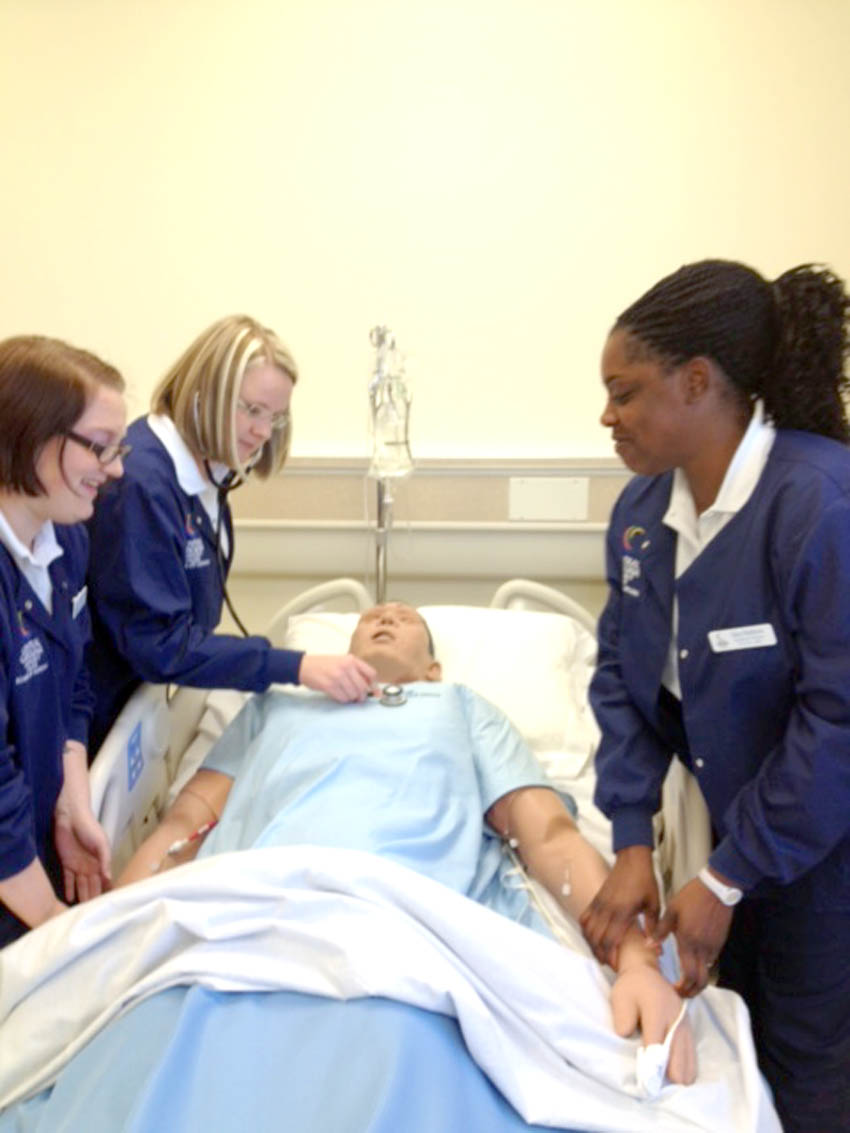College News
'Sim Man' is highly effective new teaching tool for CCCC Nursing program
Notice: This article is older than 12 months. Names, contact information, programs, titles, etc. might have changed. If you have any problems please call the main college number, 1-800-682-8353, and we will be happy to direct you accordingly.

click image to enlarge ⊗
Nursing students at Central Carolina Community College's Harnett Health Sciences Center work with ... (more)
02.16.2015 • College & Community • College General
LILLINGTON - Nursing students at Central Carolina Community College's Harnett Health Sciences Center assess a patient who has just been brought into the emergency room. A man of about six feet, the patient opens his eyes, blinks, and says, "I have chest pain."
This isn't a real life event because the patient is a high-fidelity simulator known as "Sim Man," but the technological advances this newest piece of equipment can offer the Nursing program at CCCC greatly enhances student skills.
According to a study conducted by the National Council of State Boards of Nursing, the value of simulation is unquestionable. It harbors patients from unnecessary risk and discomfort, increases opportunities for students to encounter infrequent and atypical clinical problems, and better prepares graduates to enter the workforce. In fact, high-fidelity simulation with the increased level of sophistication and realism it brings to the laboratory setting has prompted some healthcare professionals to argue that it could even be used as s substitute for clinical experience, the study asserts.
CCCC's "Sim Man" has dark hair, blue eyes, and movable parts that are operated by a computer software program. He can simulate nausea, breathing, speaking, and is equipped with portals that can receive intravenous therapies.
"He's practically human," said Nursing adjunct instructor Carol McLamb. "With the high-fidelity simulator, we can recreate an authentic hospital setting and do everything in here to take care of a patient. The software that operates the simulator comes with a complete range of patient scenarios. If a man comes in with chest pains, for example, the student follows protocols related to chest pain. They can even progress to the final outcome as long as the student performs each protocol correctly."
According to Nursing Department Chair Barbara Campbell, the simulation instructor sits in a glass-enclosed booth and selects the medical condition to be simulated by the patient. The student has no idea which medical scenario he or she must respond to. The instructor can even adapt the patient's symptoms in response to the care he receives. If the student isn't providing the proper care, the patient's condition can deteriorate. He can even die. The software also records students while in the scenario, allowing students to assess each other as well as be assessed by the instructor.
"The simulator can run the basic fundamental scenarios from respiratory assessment to critical scenarios such as cardiac arrest," said Campbell. "The simulator can blink, bleed, his tongue can swell, his fingernails can turn blue. He can cry, say 'ouch.' It really is an excellent teaching situation that promotes critical thinking skills."
"Sim Man" is actually not software, but his own computer server, Campbell explained. "The software, which is included, gets smarter all of the time," she said.
"Any way we can get the students learning is what we want to do," said McLamb. "Facilitated, active learning provided by the high-fidelity simulator is a great way for students to learn medical protocols, diagnostic skills, and timely response to critical situations."
"We have to teach students that they can care for patients with any given problem in any given situation and environment in the safest way," said Campbell. "Our high-fidelity simulator or 'Sim Man' allows us to do that."
Central Carolina Community College's Nursing program offers an Associate of Science Degree in Nursing (ADN) at the Lee County campus, and two Practical Nursing diploma programs -- one on the Chatham County Campus that starts in the fall and the other in Harnett County that starts every spring. Upon completion of the program, the student has the ability to sit for the NCLEX, which can lead to licensure.
The Nursing program is currently accepting applications until Feb. 16. If students are interested in applying, they should see an admissions counselor on any campus and check the website for upcoming information sessions for the Nursing program.
For more information about the CCCC Nursing program, contact Barbara Campbell at 919-718-7390 or e-mail her at bcampbell@cccc.edu or Teresa Mangum at 919-718-7313 or e-mail her at tmangum@cccc.edu.
Categories
- Admin, Faculty & Staff Category
- Arts & Entertainment Category
- Clubs Category
- College & Community Category
- College General Category
- Continuing Education Category
- Curriculum Programs Category
- Distance Education Programs Category
- Facilities/Buildings Category
- Finances Category
- Foundation Category
- Graduations Category
- Lee Early College Category
- NCCCS Category
- SGA Category
- Special Events Category
- Sports Category
- Students/Graduates Category
- Uncategorized Category
Archives

